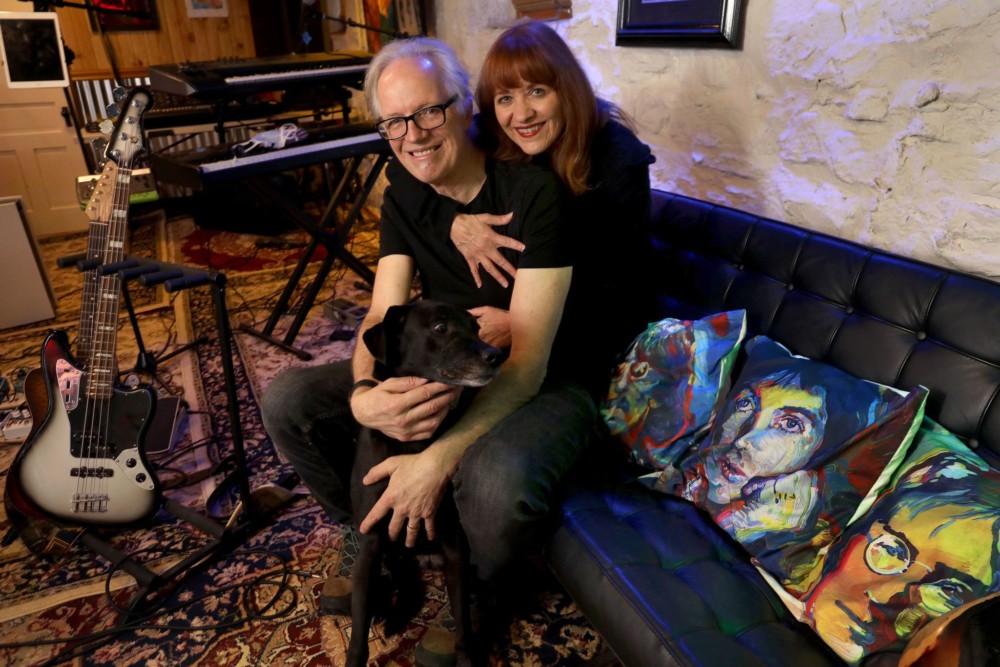Heidi Stevens
Chicago Tribune
WWR Article Summary (tl;dr) A Chicago couple is turning to social media to find a new liver. Rita Ross-Foules sent out this quick message saying “My husband’s cancer has not responded to chemo,” she tweeted on Saturday. “If you are interested in learning more or consider a partial liver donation to my love, Richard Foulkes please call the donor hotline at 773-702-0620. #liverforrick2021 #allyouneedisloveandaliver”
Chicago
Rick Foulkes, Rita Rossi-Foulkes and their two kids were on vacation in California the first time Foulkes experienced a bout of debilitating abdominal pain.
He had been biking in the mountains and returned home doubled over. Rossi-Foulkes brought him to the emergency room, where he passed out from the pain while he was waiting to see a doctor. He was diagnosed with pancreatitis and sent on his way.
That was two decades ago. The same thing would happen every few years, and a series of tests and scans never provided a definitive answer. Then, in 2008, a University of Chicago radiologist found a neuroendocrine tumor on Foulkes’ pancreas.
“He asked us to get all of Rick’s scans and he found the tumor on all of them, dating all the way back to the beginning,” Rossi-Foulkes said. “To be fair, it’s very rare and I’m sure it was tiny.”
Foulkes has undergone three surgeries, targeted radiology, hormone therapy and chemotherapy. But the cancer has grown and spread to his liver, and a recent set of scans showed two of the larger tumors on his liver continuing to grow.
A University of Chicago hepatologist recommended Foulkes consider a liver transplant.
At 68 and otherwise healthy — he was an endurance athlete until chemo slowed him down; he doesn’t have jaundice — Foulkes is a good candidate to receive a portion of a living donor’s liver. (Deceased donors’ livers are typically prioritized for patients who face near-term death without a transplant.)
In living-donor transplants, the transplanted liver portion grows to a normal size and function, and the donor’s remaining liver regrows and returns to its normal size and function.
“It’s a fricking amazing organ,” Rossi-Foulkes said.
Rossi-Foulkes is an internist and pediatrician at University of Chicago. Foulkes is an ophthalmologist who recently stopped practicing because chemotherapy caused burning and shaking in his hands and feet. They met in medical school at Rush University in the ’80s.
“Neither of us were looking,” Rossi-Foulkes said. “I was engaged to someone else. But we bonded over the Beatles.”
They play in a Beatles cover band called Elementary Penguins — he sings and plays lead guitar; she sings and plays acoustic guitar. They mostly play local fundraisers, many of which they hosted in their Riverside basement prepandemic, raising money for community organizations such as My Block, My Hood, My City and Greater Chicago Food Depository and mental health research, such as the International OCD Foundation.
Their son, Wolfgang, died by suicide in 2016 at age 23. He suffered from OCD (obsessive-compulsive disorder).
“Wolfie was just this brilliant, amazing fellow,” Foulkes said. “He was having a lot of scary thoughts that he was trying to suppress. He would hide that and try to be normal, but it was a tough life for him. We did our best, but we lost him.”
Wolfgang was his younger sibling Giuliana’s best friend, Rossi-Foulkes said. They both attended California Institute of the Arts.
Foulkes finds himself contemplating grief and risk and sacrifice and generosity and time left on Earth as he embarks on the decision to pursue a transplant and find a living donor.
“It’s a very odd thing to ask another human being to give you a piece of themselves,” Foulkes said. “And it’s not just like giving a unit of blood. It’s a big deal. If I were to cause harm to someone so that I can dance around for the next 5 to 10 years … it’s hard. I don’t know how you escape that.”
Live liver donation is considered very safe, and the risk of injury or death is extremely rare. Foulkes understands that, both as a medical practitioner and as an informed patient.
“But, wow, it is a profound thing for someone to literally put their life on the line for me,” he said. “You’re turning your body over to this trust in the health care system for the betterment of another person, and there’s nothing in this for you other than your own sense of what’s right, or what’s important to you.”
Giuliana wants to be the donor, and they may be a match. (The donor needs to be between age 18 and 55 and have type O or A2 blood.) Foulkes is 6 foot 5 inches tall, and Giuliana is almost a foot shorter, so doctors aren’t sure yet whether a portion of their liver would grow large enough to support their dad’s frame. (Giuliana identifies as nonbinary and uses they/them pronouns.)
“But I’ve lost a son to mental illness,” Foulkes said. “Do you see the quandary there? I would throw my life down for my daughter and they’re saying the same to me. But I’m on the parent side of it. You never get over the loss of a child. Every parent who loses a child will feel survivor guilt no matter how they’ve passed — I shouldn’t have let them go on that trip. I shouldn’t have bought them that car.
“It’s a hard thing,” he said. “I’m an absolute believer in our health care system and it’s a small, small, small risk. But how I would possibly be on the other side of that kind of sacrifice, it’s just so beyond thinkable. And yet, should you think of it?”
Rossi-Foulkes has been looking for a donor on Twitter.
“My husband’s cancer has not responded to chemo,” she tweeted on Saturday. “If you are interested in learning more or consider a partial liver donation to my love, Richard Foulkes please call the donor hotline at 773-702-0620. #liverforrick2021 #allyouneedisloveandaliver”
Her tweet caught my attention. Here are two doctors, immersed in the lifelong study and application of medicine and scientific advancements and procedures, pinning their hopes on an unknowable, fickle resource: Human kindness.
Human kindness on Twitter, no less.
“There’s so much negativity and division right now, especially on social media,” Rossi-Foulkes said. “The world is a pretty depressing place to be. But my husband is probably the most optimistic person I’ve ever met in my life. He’s always saying the good far outweighs the bad.”
And his theory is proving true. People have called the hotline number on their behalf. Rossi-Foulkes has received emails from people she’s never met, asking how they might help.
“My patients are some of the most amazing, brave people, so this outpouring isn’t a surprise to me,” Rossi-Foulkes said. “I see their empathy and kindness every day and it’s humbling. But I suppose this has reinforced that the majority of people are really good. It gives you a lot of hope for the world.”
Foulkes promised to keep me posted on the process. And I’ll keep you posted.
“I want to be an active guy and contribute more with my life,” he said. “I don’t want to just exist. I want to be able to travel and exercise and work and climb an Alp or something. That’s my motivation.”
I hope human kindness gets him there.
___
Distributed by Tribune Content Agency, LLC.















































































































































































































































































































































































